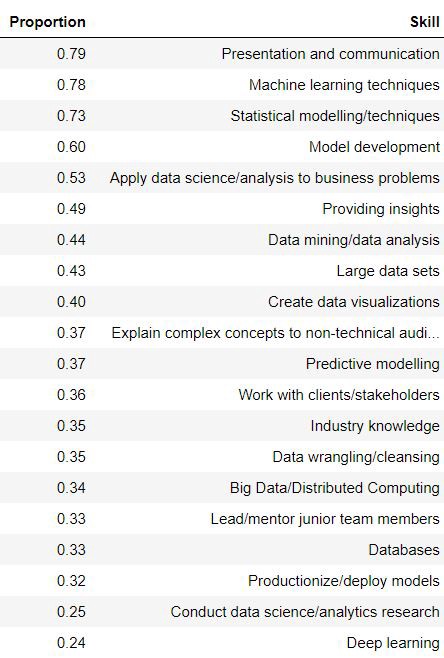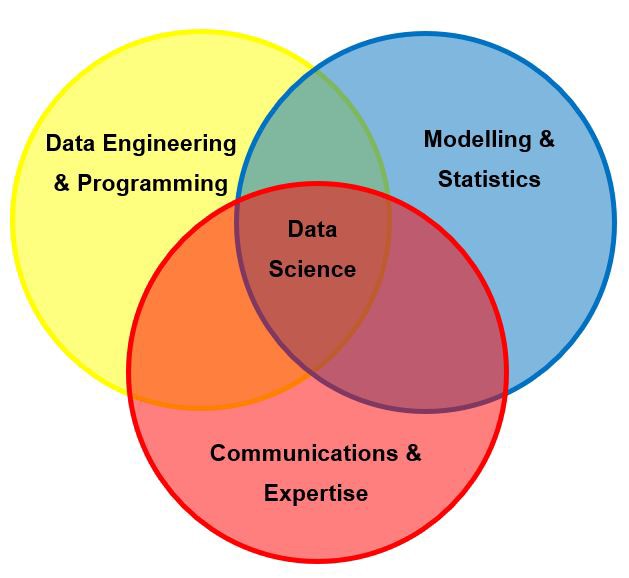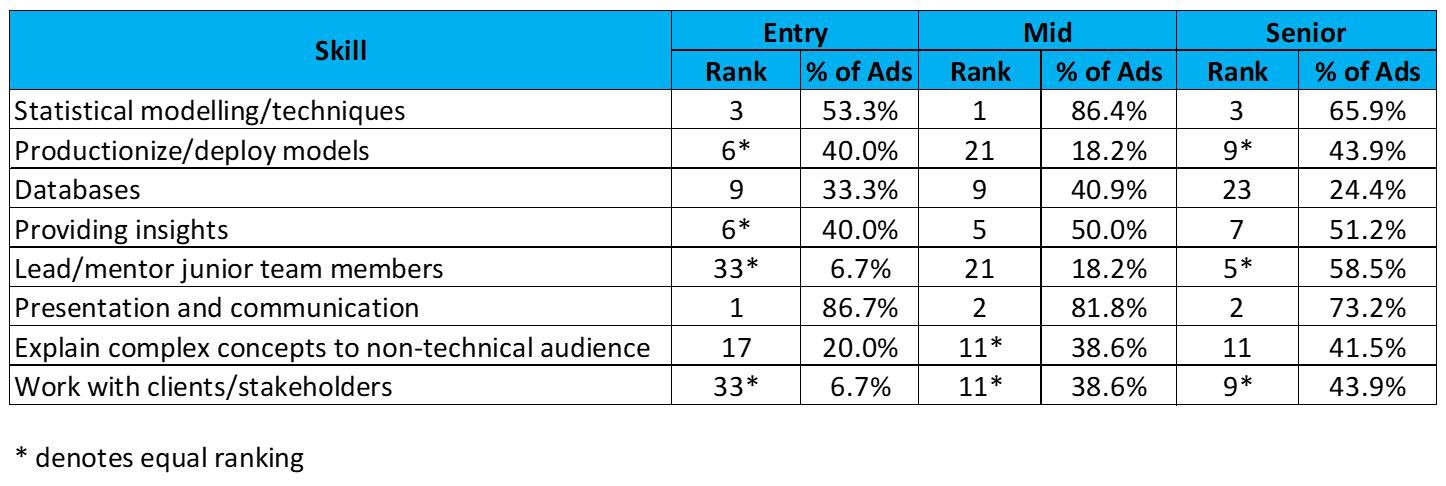Six skills to take your Data Science career to the next level.
Here is a translation of an article by Genevieve Hayes, a Data Scientist with 15 years of experience. The author talks about what skills should be developed to significantly increase the chances of finding a job in Data Science. To identify these skills, she analyzed 100 job postings by employers from Australia, Canada, the UK, and the United States.

Previously, to get a job in Data Science, there were enough basic programming skills in R or Python and knowledge in the field of machine learning acquired at MOOC (mass open online course).
Anyway, I heard that. I was not lucky to get into the field of Data Science at such an early stage.
I first heard about Data Science in 2015, almost three years after Thomas H. Davenport and J. D. Patil called Data Scientist “the most attractive profession of the 21st century.”
At that time, competition in the field was already fierce. I think since then it has only intensified. Interest in this profession is growing annually, and many universities offer a master's degree in Data Science and Analytics.
You can also say with confidence that in order for your resume to stand out from the crowd, it’s not enough just to take a course on Data Science from Coursera.
So, if you are already a “god” level programmer and have completed so many machine learning courses that you are dreaming about “random forests” and neural networks at night, then what skills do you need to work on to get into the Data sphere Science? And when you get there, in which direction to develop further?
Why don't we ask employers?
To find out what employers expect from Data Science specialists, I looked at 100 job openings in this area. All of them were posted on LinkedIn from April 22 to May 5, 2019 and belonged to companies from Australia, Canada, the UK and the United States.
When choosing vacancy announcements, the type of hiring companies, their size, industry, and job level were taken into account. Only managerial roles were not included in the selection.
From these announcements, I selected the skills indicated as selection criteria or job descriptions, and identified the 20 most sought-after skills of a Data Science specialist (excluding knowledge of programming languages and technologies).
Here they are:

These skills can be divided into three categories:

Based on the above, six skills can be identified that are worth developing in order to significantly increase the chances of finding a job:
Modeling and Statistics
Data engineering
Sociability and professionalism
(If you want to learn more about why these skills are important and what you can do to develop them, check out this post: How to Become Universal in Data Science .)
Of the 100 vacancies found in the field of Data Science, 15 belonged to entry-level posts (Junior, Intern, for “graduates”, etc.), 44 belonged to mid-level specialists and 41 to high-level specialists (Senior, Principal, Lead and etc.).
The table below shows the percentage of job advertisements that mention each of the six previously defined skills, along with the ranking of each skill.

At all job levels, “presentation and communication skills” are invariably among the two most requested skills among employers. In addition, communication skills, such as “explaining the technical concepts of the audience with humanitarian thinking” and “working with clients / stakeholders”, are becoming increasingly important as the length of service.
Therefore, if you had to choose one skill, the development of which would need to be worked on, sociability would be the right choice.
But why dwell on only one thing?
“Statistical modeling / statistical analysis” is also included in the top three core skills at all job levels, which indicates the importance of their development. This is especially important for professionals in the early stages of a career.
When moving from entry-level posts to a higher level, it should be borne in mind that the percentage of vacancies in which “statistical modeling / statistical analysis” is referred to as desired skills increases from 53.3% to 86.4%.
Those planning to take a higher position, it is important to pay attention to the development of leadership skills and mentoring. Provided that statistics skills are already developed.
While only 6.7% of entry-level posts in the field of Data Science require leadership / mentoring skills, in higher posts they are already required in 58.5% of cases (an increase of 873%), which puts them in fifth place in demand .
It will take some time to hone all of the above skills, but it should be so. If you could master all the knowledge necessary in the field over the weekend, would you like to devote the years of your life to this work?
However, by focusing on only one or two skills at a time and devoting them only a few hours a week, you will gain a set of demanded skills that will help you stand out from the crowd and increase your chances of career growth or getting your desired job in Data Science.
So, what skill are you going to master in the first place?

Previously, to get a job in Data Science, there were enough basic programming skills in R or Python and knowledge in the field of machine learning acquired at MOOC (mass open online course).
Anyway, I heard that. I was not lucky to get into the field of Data Science at such an early stage.
I first heard about Data Science in 2015, almost three years after Thomas H. Davenport and J. D. Patil called Data Scientist “the most attractive profession of the 21st century.”
At that time, competition in the field was already fierce. I think since then it has only intensified. Interest in this profession is growing annually, and many universities offer a master's degree in Data Science and Analytics.
You can also say with confidence that in order for your resume to stand out from the crowd, it’s not enough just to take a course on Data Science from Coursera.
So, if you are already a “god” level programmer and have completed so many machine learning courses that you are dreaming about “random forests” and neural networks at night, then what skills do you need to work on to get into the Data sphere Science? And when you get there, in which direction to develop further?
Why don't we ask employers?
Most Important Skills for Data Science Professionals
To find out what employers expect from Data Science specialists, I looked at 100 job openings in this area. All of them were posted on LinkedIn from April 22 to May 5, 2019 and belonged to companies from Australia, Canada, the UK and the United States.
When choosing vacancy announcements, the type of hiring companies, their size, industry, and job level were taken into account. Only managerial roles were not included in the selection.
From these announcements, I selected the skills indicated as selection criteria or job descriptions, and identified the 20 most sought-after skills of a Data Science specialist (excluding knowledge of programming languages and technologies).
Here they are:

These skills can be divided into three categories:
- Modeling and statistics : includes machine learning, statistical modeling, and model deployment.
- And data engineering and programming : includes primary data processing, working with databases and distributed computing (if programming languages were included in the analysis, I would also indicate them in this category).
- Sociability and professionalism : includes deep professional knowledge, the ability to analyze data, manage and mentor junior employees.

Based on the above, six skills can be identified that are worth developing in order to significantly increase the chances of finding a job:
Modeling and Statistics
- Statistical modeling
- Model Deployment
Data engineering
- Work with databases
Sociability and professionalism
- Providing information on the results of data analysis
- Leadership and mentoring
- Sociability
(If you want to learn more about why these skills are important and what you can do to develop them, check out this post: How to Become Universal in Data Science .)
What skills should I learn first?
Of the 100 vacancies found in the field of Data Science, 15 belonged to entry-level posts (Junior, Intern, for “graduates”, etc.), 44 belonged to mid-level specialists and 41 to high-level specialists (Senior, Principal, Lead and etc.).
The table below shows the percentage of job advertisements that mention each of the six previously defined skills, along with the ranking of each skill.

At all job levels, “presentation and communication skills” are invariably among the two most requested skills among employers. In addition, communication skills, such as “explaining the technical concepts of the audience with humanitarian thinking” and “working with clients / stakeholders”, are becoming increasingly important as the length of service.
Therefore, if you had to choose one skill, the development of which would need to be worked on, sociability would be the right choice.
But why dwell on only one thing?
“Statistical modeling / statistical analysis” is also included in the top three core skills at all job levels, which indicates the importance of their development. This is especially important for professionals in the early stages of a career.
When moving from entry-level posts to a higher level, it should be borne in mind that the percentage of vacancies in which “statistical modeling / statistical analysis” is referred to as desired skills increases from 53.3% to 86.4%.
Those planning to take a higher position, it is important to pay attention to the development of leadership skills and mentoring. Provided that statistics skills are already developed.
While only 6.7% of entry-level posts in the field of Data Science require leadership / mentoring skills, in higher posts they are already required in 58.5% of cases (an increase of 873%), which puts them in fifth place in demand .
Finally
It will take some time to hone all of the above skills, but it should be so. If you could master all the knowledge necessary in the field over the weekend, would you like to devote the years of your life to this work?
However, by focusing on only one or two skills at a time and devoting them only a few hours a week, you will gain a set of demanded skills that will help you stand out from the crowd and increase your chances of career growth or getting your desired job in Data Science.
So, what skill are you going to master in the first place?
All Articles